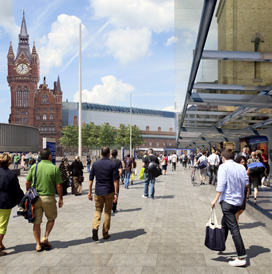As the UK goes on summer holidays, an IT security firm advises on keeping your technology safe. People pack up their smartphones and tablets, sunscreen and shorts. With connected devices, it’s never been easier to record memories and stay in touch with friends at home. Technology makes travelling easier; but there are digital dangers on the road.
Internet cafes
When travelling, it’s convenient to use public WiFi hotspots in places like airports and restaurants, but 52 per cent of people say they are concerned about the security and privacy of public WiFi, and rightly so according to Sean Sullivan, security advisor at F-Secure Labs. He says that public WiFi networks should be thought of as just that: public. Because you’re sharing the network with strangers, there’s the risk that someone is using readily available software that snoops on what you’re doing.
Sullivan says: “It may feel private because you’re using your personal device, but it’s not.” He advises against doing anything via public WiFi that you wouldn’t want an eavesdropper to know – including logging into accounts with passwords. “I use public WiFi happily for a topic I would discuss with a friend on the metro. Banking, I do at home,” he says.
The same goes for using public computers in places such as libraries or internet cafes. Sullivan recommends using them only for doing innocuous things like reading the news, as password-stealing spyware could be hosted on the machine.
If you must use public means to communicate with loved ones, one tip is to create a separate holiday email account that you’ll use only while away. “That way, if someone hacks your holiday email account, they might see emails from your mum and the cat sitter, but they won’t have access to the other sensitive data that would be in your main email account.”
Banking
Eighty-five per cent of people say they do online banking from their computers, and 24 per cent from their smartphones. So what if you absolutely must make a transaction while onholiday? It’s probably best to use your mobile data plan with your bank’s mobile app, even if it means roaming a bit. It may cost more, but it’s cheaper than getting your account cleaned out.
But banks use https connections, so aren’t they safe even through public WiFi? Usually, but it’s important to be aware of other factors as well. Some 39 per cent of people report using just one or a few passwords for all their accounts. Potentially, if you use the same password at an unsecured site that you use at your bank’s secure one, a snoop could access your bank account too. Snoopers also use low-tech methods, peeking over your shoulder as you enter a password.
Keeping your content safe on the go
Some 67 per cent of people value the content on their device more than the device itself, illustrating the importance of taking back-ups before leaving on a trip.
Public WiFi hygiene:
· Don’t let your device connect to public WiFi spots automatically.
· Delete out the WiFi access points you’ve used when you arrive home.
· Don’t be logged into apps you don’t need while traveling.
· When logging on to an unfamilar network, check with the host that the one you are logging onto is really theirs and not one a snoop has set up to trick you.
· Be aware of your surroundings and anyone who could be trying to peek over your shoulder.
· Use a unique password for each account.
· For laptops, disable file sharing and turn on the firewall, setting it to block incoming connections.
· Use a VPN (virtual private network) if possible, which secures your connection even on public WiFi.
· Use a travel router with a prepaid SIM card for your own personal WiFi network.
· At the very least, watch for the padlock and “https” in the address bar for any site with your personal information. If they’re not there, avoid the site.
· A good general rule: Assume anything you do over public WiFi is part of a public conversation.
F-Secure Digital Lifestyle Survey 2013 covered web interviews of 6,000 broadband subscribers aged 20–60 years from 15 countries: Germany, Italy, France, the UK, the Netherlands, Belgium, Sweden, Finland, Poland, the USA, Brazil, Chile, Colombia, Australia and Malaysia. The survey was completed by GfK, April 2013.










